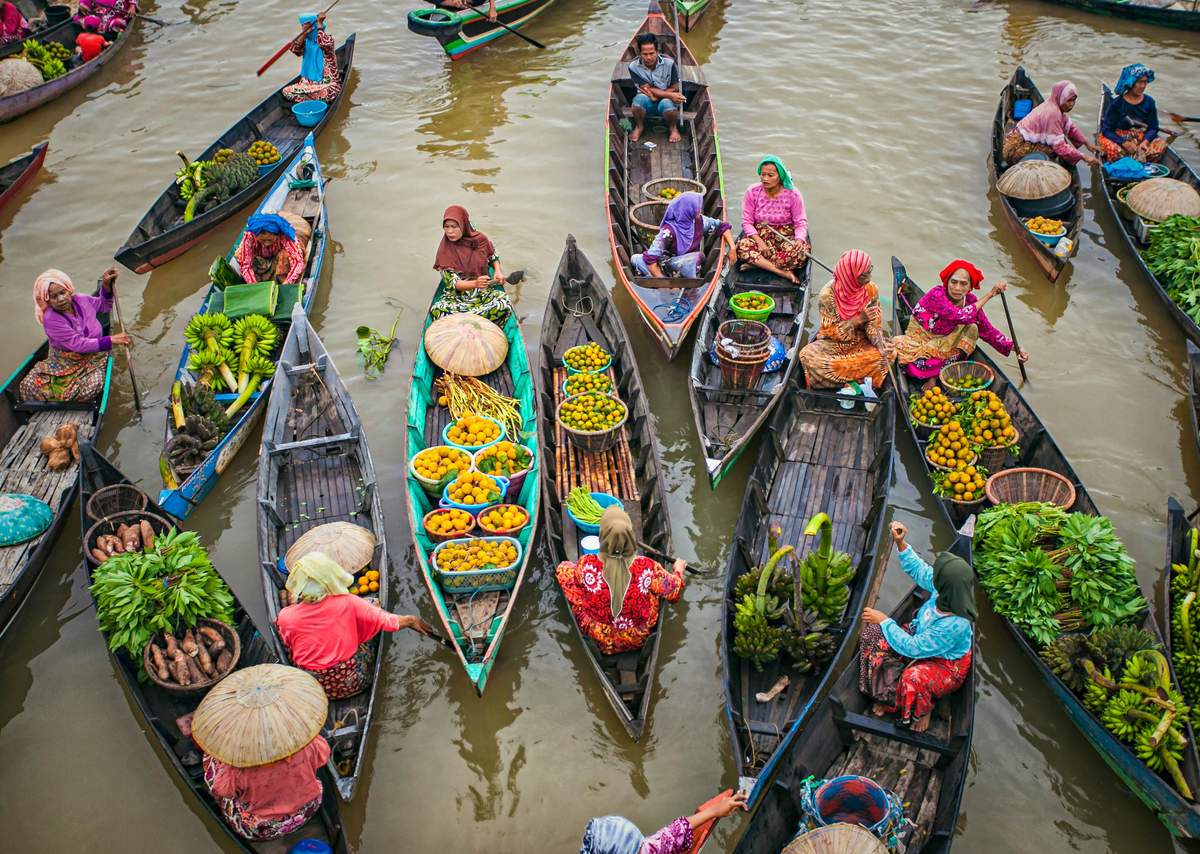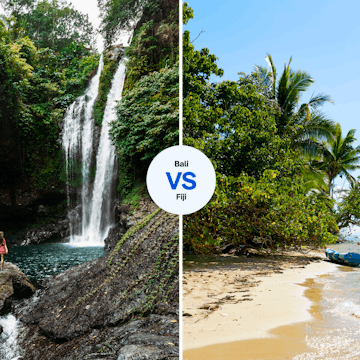

Whichever island you're on, head to the west coast for the best sunset views © Marcos Welsh / Getty Images
As far as tiny, picturesque islands go, the Gili Islands have it all and then some. Glassy waters full of colorful marine life, local tradition and culture, a rowdy nightlife scene, and also plenty of places to completely relax under the sun – it's the real deal.
These three islands – Gili Trawangan, Meno and Air – are generally safe and fairly easy to navigate. As a first-time visitor though, you'll want a quick travel guide on a few specifics regarding trip planning, respectful etiquette, and safety before you arrive.
Take note of these 11 tips for a smooth journey around the Gili Islands.

1. Pack light, or at least skip the giant suitcase
We've been there and witnessed it: giant suitcases piled into the back of the Gili boats, later being lugged around on dusty laneways by sweaty, regretful travelers under the hot sun. Trust us on this one: packing light is the way to go for the Gili Islands. Either leave your suitcase at accommodations in Bali or use a service such as Bali Store Luggage to take care of it while you're island hopping. Between the logistics of getting on and off the Gili boats, plus the fact that the Gili Islands don't have any motorized vehicles – you're much better off bringing only what's comfortable to carry on your back.
2. Decide how to split your time between the three islands (or just wing it)
Whether you enjoy a quick weekend getaway or slowly move through all three islands over the course of a week, deciding how to split your time in advance is advantageous. Each island brings a different personality, with Gili Trawangan being notorious for parties and nightlife. Gili Meno, in the middle, draws a more laidback crowd – those seeking tranquility (and a decent number of honeymooners). To the east, Gili Air falls somewhere in the middle of the chill scale, where it's easy to bliss out in silence or get social at one of the island's many cheerful beach bars.
Even though the islands are small, you can have a completely different experience depending on where you go and what you do. Plan accordingly.
3. Team up with other travelers to share boats between islands
It's possible to take public boats between all three Gili Islands, but they don't run very frequently – usually just a couple times per day – and plans are subject to change. If you're looking to travel on the fly, or completely on your own schedule, the best way to move between the Gili Islands is to team up with other travelers and share a private boat transfer. Walk down to the port and chat up some of the friendly boatmen waiting for your business, preferably with a friend or two to split the cost. Expect to pay around 300,000Rp for the entire boat for a one-way, depending on your negotiation abilities.
4. Dress and behave respectfully
While you explore the Gili Islands, you might encounter a few signs that say "no swimwear in the village" – or simply a picture of a bikini with a big red no symbol on top of it. Most residents of the Gili Islands are Muslim, and dressing modestly is important for traveling respectfully. There's no issue rocking swim trunks or a bikini when you're actually at the beach – but cover up when you're heading inland, especially when passing through residential areas. Keep a big t-shirt and sarong in your bag, and you'll be good to go.
5. Check the calendar for any holidays
There are two holidays to be aware of, both bring different experiences in the Gili Islands: Ramadan, a Muslim holiday, and Nyepi, a Balinese holiday. Ramadan is usually around March or April where people fast from sunrise to sunset each day for a month. You can still travel to the Gili Islands, but be advised that some businesses will close earlier and parties are limited during this time. During Nyepi, Bali's day of silence which typically falls the first or second week of March, the entire island shuts down – leading many travelers to head to the Gili Islands where businesses remain open. This can make things pretty busy for two or three days over Nyepi.

6. Lock up your bicycle when you're not using it
You won't find any motorized vehicles on the Gili Islands, where the best method of transportation is either via foot or bicycle. Petty theft isn't all that common – but locking your bike whenever you're not using it is a best practice just in case. Insurance for bike theft isn't really a thing here, so if someone were to roam off with it, you'd be on the hook for covering the cost. Most folks simply put the lock around their tire rather than fastening it to a stationary object.
7. Always drink purified water
Tap water is not safe for consumption across Indonesia so always only drink water you’ve either purified yourself; you have purchased in a sealed bottle; or have refilled your reusable from a clean water source to stay hydrated. A lot of people brush their teeth with the tap water without experiencing any issues, but if you're really concerned, use bottled water for that too.
8. Watch out for mosquitos
Catching dengue fever is the biggest risk from mosquito bites here – not to mention uncomfortable itchiness. Mosquitos are a year-round experience in the Gili Islands, slightly less so during the dry season from roughly June until October. The best way to prevent bites or mosquito-induced illness is by preparing yourself with bug spray, especially around dusk.
9. Drugs are illegal in Indonesia
You might've heard stories of magic mushrooms in the Gilis from other travelers – and it's true, several beachside cafes openly advertise the sale of magic mushrooms despite the fact that Indonesia has strong anti-drug laws. It's not uncommon to get offers for "magic shakes" or mushrooms while walking on the street, either. Do beware: Indonesia has extremely strict laws against illicit substances, including mushrooms.
Intoxication or possession is punishable by lengthy imprisonment (or worse!). According to Indonesia's tourism board, "Possession is punishable by 4 to 12 years of imprisonment. There is also IDR 800 million to 8 billion (US$89,600 to US$896,000) worth of fines."

10. Stick to beer and wine if you want to drink
Throughout the years, there have been countless reports of travelers in Indonesia becoming ill due to methanol poisoning from alcoholic spirits. The consumption of this illegal tainted alcohol – which has occurred even in fancy, upscale resorts – can cause severe illness, blindness, or even death. Methanol-tainted alcohol is typically the result of cost cutting, oftentimes far earlier in the supply chain before bars and restaurants have any say in the matter. The safest way to get a buzz is by drinking beer or wine, so load up on the Bintang beers or get champagne tipsy all day long.
11. Head west for sunset
When the fiery sun begins to descend closer to the horizon, make your way west. Regardless of whether you're on Gili Trawangan, Gili Meno, or Gili Air – the best sunset views are on the west coast, accompanied by views of Bali's towering Gunung Agung volcano off in the distance. It's the best way to slip into the evening, typically accompanied by sherbet-colored hues in the sky and good vibes.
















